We love traveling to France… picturesque villages, castles. We love the food, the wine. What about the people of France? They are part of the cultural tapestry that is France. Without them, you have buildings and streets, but no life.
For decades, Americans have held a stubborn belief that the French dislike them. I’m not sure where this began and how it has persisted. There were periods where we were at odds politically, such as during the Gulf War, but those days are far behind us. In reality, there is no true anti-American sentiment among the French today, with the exception of random individuals who will always have their opinions. As we do ours.
What lies behind this belief is perhaps a lack of understanding, knowledge, and even a lack of patience for differences. We skim over the surface as we enjoy the architecture, but don’t stop to understand how the French are different from us and how we can appreciate the differences.
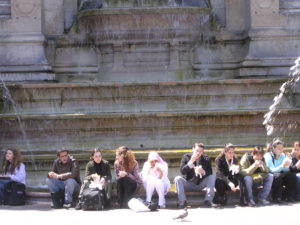
It is true, French and Americans are culturally different in certain ways. Some differences are slight and others are huge. But historically, the U.S. and France have been allies, co-helpers. And for centuries, mutually fascinated by one another’s cultures. The differences can be part of that fascination.
Here are a couple of books that will help you go deeper into the French personality if you like! If you’re short on time, the paragraphs following will give you a good summary.
Books: The Bonjour Effect and Sixty Million Frenchmen Can’t be Wrong, both by Julie Barlow and Jean-Benoit Nadeau. Numerous other books exist to help understand the French people better.
The French are: proud of their country and proud of their language, strong in their identity as French people, even if they sometimes complain about their politics, economy, etc. The French themselves will say that complaining is a national pastime! The majority would not live anywhere else if given the choice.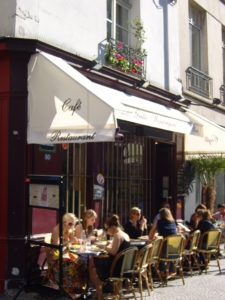
They are aesthetically oriented and strongly support the arts (there are sometimes government subsidies for artists.) They are deeply family-oriented and have a strong sense of personal family history, as well as cultural history. The average French person knows much more about the history of France than the average American knows about U.S. history. History and tradition are given an important place in peoples’ minds as well as on every street corner. (How many Rue Emile Zola and Avenue Jean Jaurès have you seen?) In fact, much of what I know of the French Resistance is from street signs in Paris. The French live face-to-face with the past, whereas an American are pointed to the future, as they pursue personal and societal progress and development.
The French have an inclination to rebellion, beating the system, taking to the streets. Demonstrations and occasionally riots aren’t rare events (as you know from reading the news.) However, they are also faithful friends and very social. Generally speaking, they are rational, logical, and intellectual. Many famous philosophers were French, and those who weren’t certainly spent time there. The same can be said for artists.
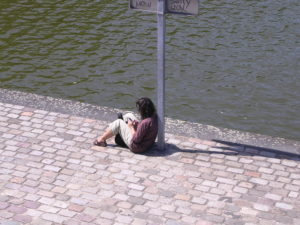 What to Expect
What to Expect
- The French (and Europeans in general) won’t greet you on the street. They don’t know you personally so they have no reason to greet you. That doesn’t mean they don’t like you. It is cultural. Don’t smile at strangers as you are walking outside. It’s viewed with suspicion. Once you know someone, of course, it’s a different story. And there’s no problem smiling at people you are interacting with. By all means, do! You can greet people in shops and you should. It is expected. Say, “bonjour” as you enter or as you approach the cash register with your purchase.
- In restaurants, your waitperson won’t necessarily be warm or outgoing, just efficient. He or she doesn’t have only a few tables but might have the entire room to take care of, so be patient. You’ll have to request your bill. Say “l’addition, s’il vous plait”. The bill is the “addition”, pronounced l’add-ee-see-on.
- If you know some French, people may correct you if you make a mistake. Don’t be offended. This is normal. They have a sense of ownership for the language and are trying to help. Be thankful for that.
- If you ask someone for help…directions, finding a product in a store, etc., you’ll be surprised at how willing they are to stop everything and take their time to help you, even going out of their way. Being helpful is natural to them.
- The French like a lively conversation. It may look like a debate or an argument, but it shows interest and doesn’t lead to a fight. Americans, on the other hand, are often uncomfortable with loud expressions and disagreement.
A Traveler’s Role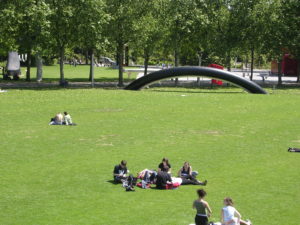
You can increase the likelihood of pleasant and smooth encounters with the French if you follow these few guidelines.
- When you enter a small store, post office, bakery, say “Bonjour”. It isn’t just a greeting, it opens up the conversation, whatever it is. You might feel silly saying it to strangers, but it is the culturally correct thing to do. You’ll get better service and a nicer response.
- On the same theme, you should be sure to learn at least the polite words before your trip. I have a FREE online mini-course that will give you the correct pronunciation, so you should take advantage of it before your trip. Knowing polite expressions can also be a passport to good relationships with the French people you encounter. If you make an effort, even if you only know three words, it is much better than launching into, “Do you speak English?” without even trying. We would likely want the same thing in our own country.
- If you enjoy traveling to France, it is a worthwhile investment to learn the basics of getting around. My book Real French for Travelers would be a help and includes lists of relevant travel vocabulary.
- Americans generally speak louder than Europeans. So try to be aware of the volume of your voice or your group’s noise level whenever you are in the métro, a restaurant, a museum, or any closed building.
- Don’t ask a person what they do for a living (common in the U.S. as a conversation-starter.) This isn’t done in casual first meetings. That information may be volunteered, but you should find other things to discuss at first.
Basic Polite Vocabulary
Bonjour (hello) Bon- joor (the N on bon is nasal) After 6 pm say Bonsoir Bon-swar
S’il vous plait (please) Seel-voo-play
Merci (thank you) Mare-see
De rien (you’re welcome) duh-ree-en
Excusez-moi (excuse me) ex- kew-zay-mwah
Au revoir (Good bye) oh-revwah
As you prepare for a trip to France, be sure to EXPECT to meet interesting and wonderful people, and try to learn what you can about the culture through its people. They are one of the national treasures of France.

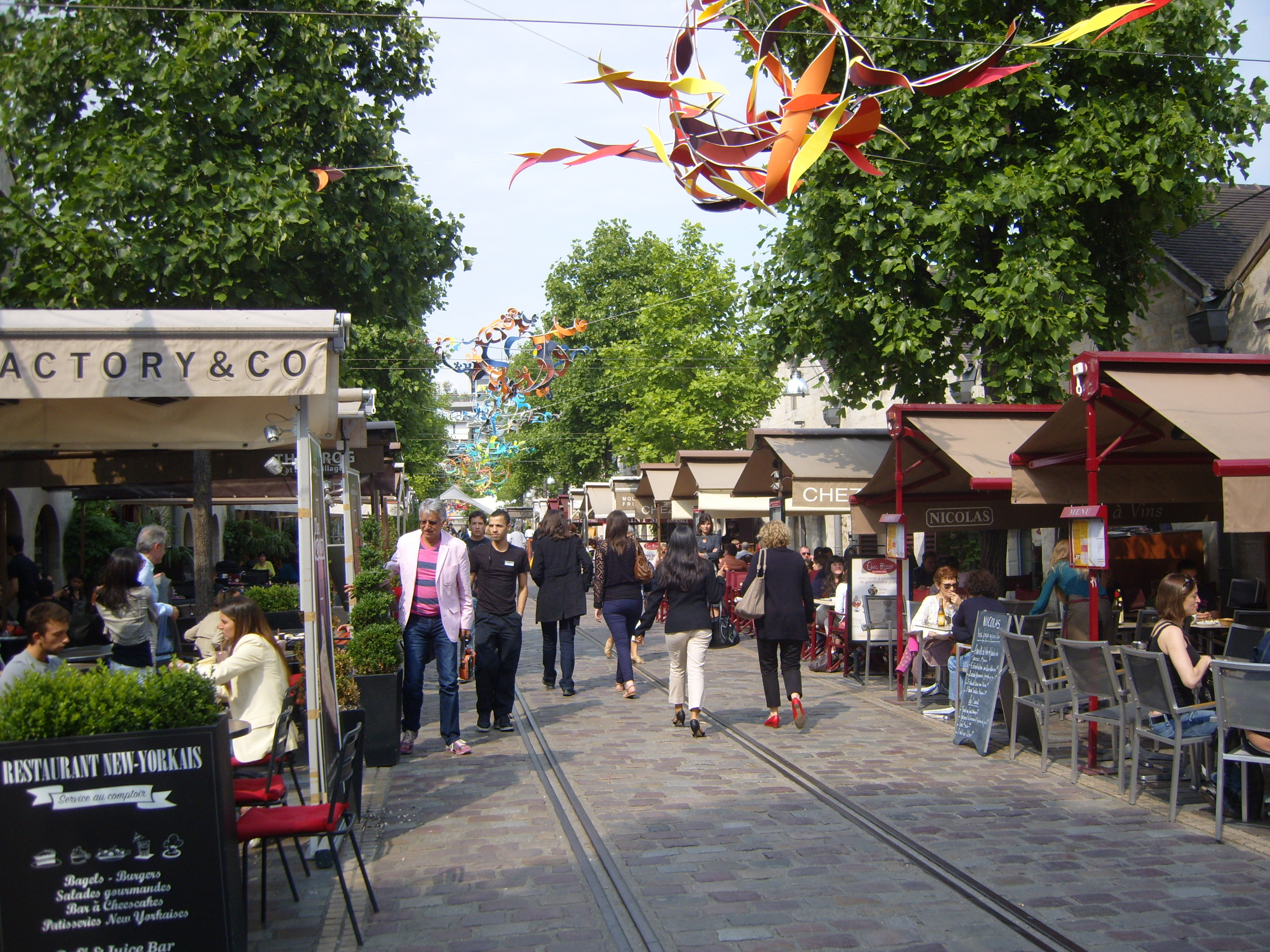




Brilliant Blog!! You are very perceptive and put things in perspective.
We are trying to renovate a village house in “central France” and
have observed all the “social mores” that you mention. Americans
tend to be less observant of “social boundaries” thus they also tend
to intimidate Europeans.The French have a quick sense of wit and
humor…..that is sometimes missed by”us Americans”.
Thanks for your comments, Robert. I’m glad you like the article. I lived in France for over a decade, so I have observed many things (most of which I appreciate!) about the French people.
Excellent article! Now if only the planes are flying in October…
Thanks, Jim. I hope you are able to travel in the fall. Should be safer then, but no one knows at this point. October is a lovely time to travel to France. Hope it works!